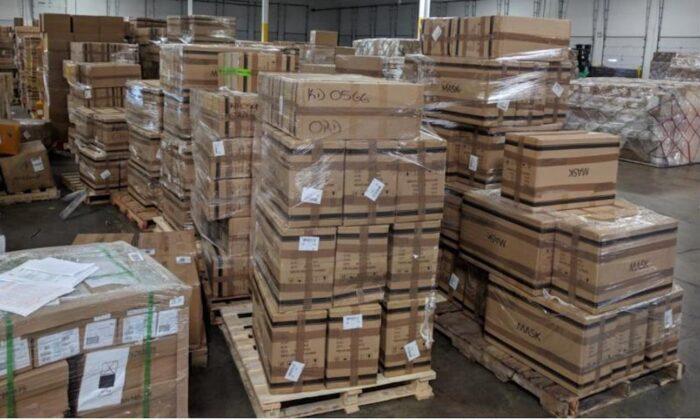Despite assurances that it would crack down on counterfeit goods and intellectual property flowing from its country, the Chinese communist regime continues to reap billions from the sale of fake merchandise and it’s now affecting an area of the U.S. economy that many wouldn’t suspect.
Multiple studies have shown that little appears to significantly stem the tidal wave of bogus goods leaving on cargo ships each and every day from any number of Chinese ports of call or by mail. While most of the public focus has been on tennis shoes, luxury watches, handbags, clothes, cosmetics, cell phones, and computer software, there has also been what some consider a direct attack on the financial markets through the numismatic industry.
In the past few years, I’ve reviewed several customers’ coin collections and sadly detected one or more counterfeit coins. In one instance, the majority of one person’s collection consisted of counterfeit proof Buffalo one-ounce gold coins, with all coins appearing in what looked like genuine NGC holders. The holders themselves were fraudulent.
Millions of normal circulating U.S. coins, such as quarters and half dollars, as well as bullion and rare collectible coins, have now been counterfeited by Chinese interests. More recently, U.S. law enforcement seized over a million dollars’ worth of counterfeit circulated George Washington quarters believed to have been made in China.
- According to Forbes in 2018, counterfeiting is the largest criminal enterprise in the world, greater than illicit drugs or human trafficking. It’s expected to grow to $2.8 trillion by 2022, costing 5.4 million American jobs.
- In a 2016 interview for CBS Money Watch, titled “China’s Largest Export Boom: Fake Gold Coins,” Kathy Kristof interviewed experts, including me, on the proliferation of Chinese-made counterfeit coins being sold on the internet.
- Craig Crosby, founder of The Counterfeit Report, has detected millions of knockoffs sold online on eBay, Alibaba, Amazon, and Walmart. He notes that over 80 percent of all counterfeits are made in China.
In highlighting MLB’s hypocrisy on human rights, the move came at the same time it pulled the All-Star Game from Atlanta and unbelievably moved it to more voting-restrictive and less-diverse Denver, because of a recent change in Georgia’s voting requirements that seems to help ensure more fair and secure elections.
Of course, the actions of the communist Chinese regime don’t reflect on the many fine Chinese Americans and their families, some of whom are my friends.
I taught counterfeit detection courses for the American Numismatic Association and served on the National Anti-Counterfeiting Task Force. My associate, Jerry Jordan, ordered numerous coins and bars from the Wish platform over the past two years. Thankfully, they were very cheap, but they were all obvious fakes from Chinese vendors, and all were delivered by the U.S. Postal Service.
Out of many test orders, here are several examples.
There was a “Credit Suisse 1-ounce Gold Bar” costing $2, plus $3 shipping. It would have been worth $1,500 when he ordered it and nearly $1,900 today, but it’s essentially worthless because it was fake. He also ordered an 1899 “Queen Morgan Silver Dolar” (sic)—that would have graded XF (Extra Fine) and been worth $140—for just $3.89 shipping. The counterfeit coin was listed at no charge. Then he ordered a gold coin that would have been worth $10 million if it were genuine—a 1933 St. Gaudens Double Eagle—but it sold for $1.83, plus $2 shipping, so you can’t fault them for greed.
They chose some extremely valuable coins and sold the knockoffs for a ridiculously low price. But none of these fake coins had the word “COPY” stamped on them, as is required by the updated 2014 U.S. Hobby Protection Law for counterfeits.
On March 2, 2020, H.R.6058 (dubbed the “Shop Safe Act of 2020”) was introduced in the House of Representatives. It would amend the “Trademark Act of 1946” to give certain e-commerce platforms contributory liability when counterfeits are sold that pose a health risk to consumers. The key phrase is “health risk,” which seems to shut coins and some other important products out of the equation, even though some fake coins and precious metals coming from China contain traces of cyanide, which could pose a significant health risk.
They found counterfeits on all of these platforms, and over half of the products they bought were fake.
Some of the health dangers included alarming amounts of heavy metals in health and beauty products. One lipstick had 751 times the amount of lead that Health Canada considered acceptable for cosmetics. As scientists have shown, lead affects a person’s cognitive ability, and it’s especially dangerous for children.
Experts interviewed by the CBC were concerned not just about the health issues related to counterfeiting.
“All of that money is used illegitimately to support other criminal activity,” Lorrie Turner, legal counsel and senior vice president of brand protection for headwear brand New Era Cap Co., told the CBC. “While you may think it’s just an individual trying to earn money, ultimately all of that money goes toward nefarious things.”
For our purposes, leaders in the numismatic community will work hard to see that this bill is modified and reintroduced in 2021 so that it would cover counterfeit coins, most of which are made and delivered from China. Specifically, we would like to see it contain a reference to the Hobby Protection Act, as amended in 2014, to cover counterfeit coins.

